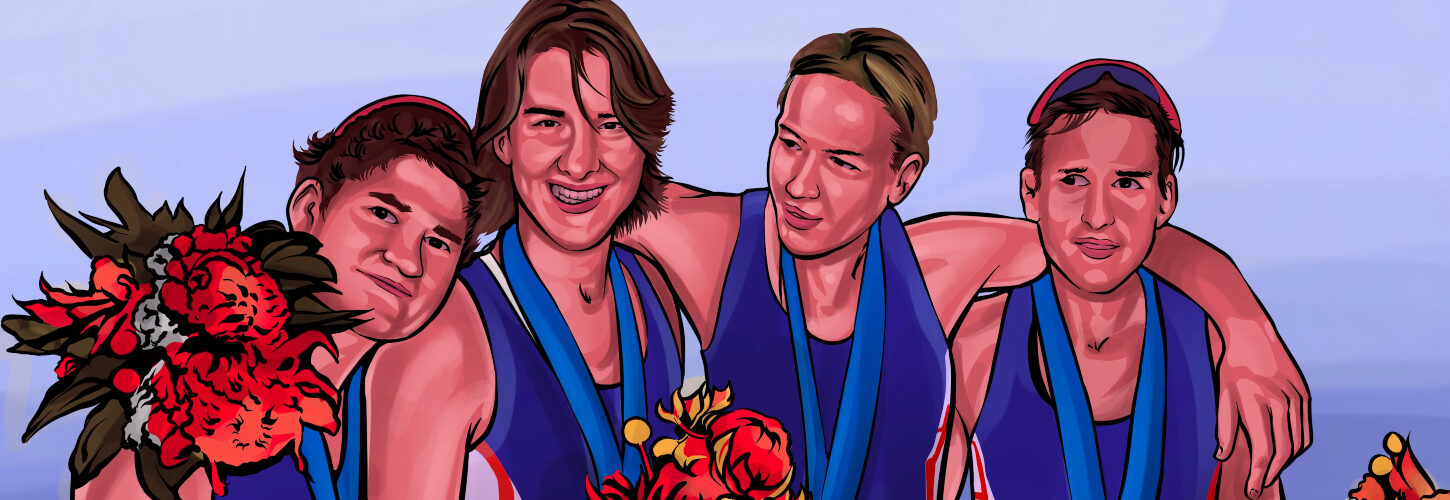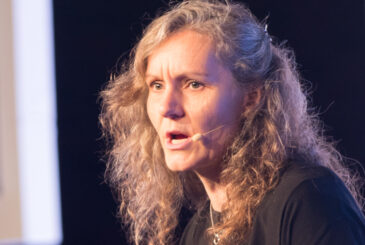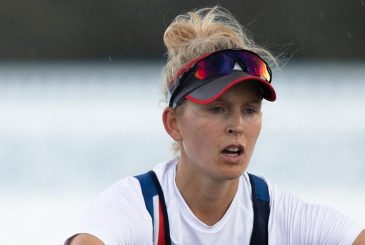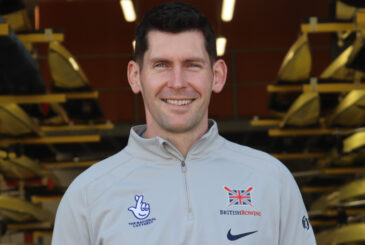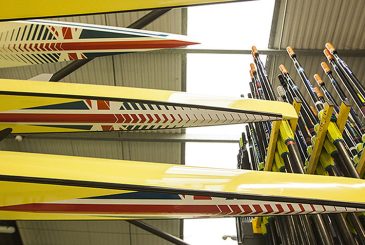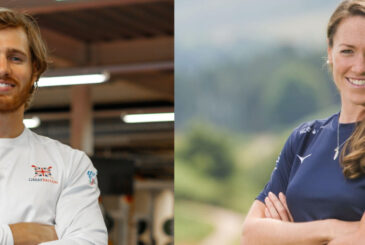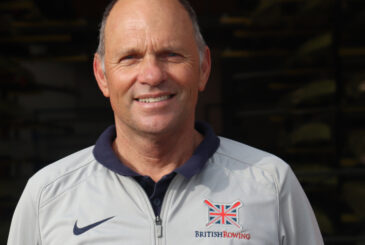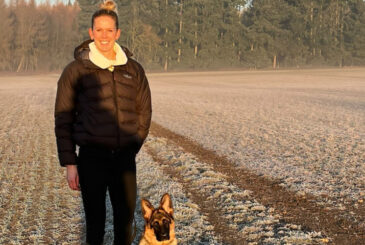In a new series celebrating some of the most dramatic Olympic and Paralympic finals since 2000, Martin Cross selects his top races, reliving the experience with athletes involved. In the second Olympic final of the series, we revisit the 2000 Games in Sydney where GB women won their first-ever Olympic medal in the women’s quad. Britain’s Gillian Lindsay and Kerstin Hartleib from Germany reflect on that amazing race
It was the race that started a new era for British women’s rowing. At the end of the quads’ final in the Sydney Olympics: Guin and Miriam Batten, Katherine Grainger and Gillian Lindsay had won Britain’s first-ever Olympic medal in women’s rowing.
They took a brilliant silver medal, holding off the Russians by the narrowest of margins. Ahead of those two crews, the Germans produced a dominant performance to take yet another gold medal in the quad sculls. It wasn’t all plain sailing though. The selection process of the British quad was controversial, and the Germans faced illness during the regatta. Martin Cross got together with Kerstin Hartleib (then Kowalski), stroke of the German quad and Gillian Lindsay, who sculled at ‘two’ in the British crew. It was the first time the two women had met.
Kerstin: I was in the quad because I finished fifth in the German singles trials. It was a big pressure to be part of the German quad because it usually always won. I wasn’t the strongest, but I had a good feel for the rhythm, so I was in the stroke seat. My twin sister, Manja, sculled in the bow seat. Although I always argued with my sister in the past, in the quad we really got on well. Our Olympic selection wasn’t confirmed until the very end.
You still felt the pressure and if you didn’t do well enough you might lose your seat. But we had a good world cup season winning all the regattas, so we knew we were well prepared for Sydney.
“I looked down and found a four-leaf clover. I put it in my pocket, and thought: this is really good luck”
Gillian: I wasn’t in the quad until six to eight weeks before the Games. Originally, I was selected in a double with Frannie [Houghton] but when Sarah Winkless, who was in the quad, got injured, Mike Spracklen got us to help out. Mike thought the quad was performing better than the double, which wasn’t likely to medal, so there was a seat race out in Aiguebelette between me, Fran and Sarah. That’s when it got really awkward in the women’s squad. Emotions were running high, the three of us found it really, really difficult.
For Sarah, it was a really tough blow not to end up in the quad and for her and Frances to be in the double. But for me the important thing was that the focus was on the quad. There was just six weeks to go before the Games.
Kerstin: We spent a month training at Penrith on the Nepean River. It was quite cold. We had already had a training camp in Sydney where we’d done all the tourist things, so when we came for the Olympics we were happy to be able to focus on the training. I was happy that Sydney got chosen to be the Olympic venue ahead of Berlin because everybody was sport-mad in Sydney. Our coach was Jutta Lau, who was from the same club as my sister and me. She was a double Olympic medallist and very strict.
“When you came to the final hundred metres, this cauldron of noise sucked you into the final stretch of the race”
Gillian: We had a really good preparation. Initially, I was at stroke. But I knew I felt better in the middle of the boat, making the calls and I suggested this to Mike who – at first – wasn’t that keen. On one of our last 2,000m pieces our quad beat the men’s four on percentage times, so we knew we were good and that that combination was better. It was a really good boat to be a part of.
Kerstin: When the racing started it was amazing. Normally, there are hardly any spectators, but when you came to the final hundred metres this cauldron of noise sucked you into the final stretch of the race. Although we won our heat, beating Ukraine, we weren’t happy – it didn’t feel good enough.
After the heat we had a long time to wait until the final. In the middle of that week Meike Evers was sick in the night. The next day we kept her on rest. But, so as not to show to the outside world that we had a weakness in the boat, we had Kathrin Boron – from the double- to step in for a training session, so nobody knew of the problem.
Gillian: Our heat was our first race. We didn’t know what to expect. We drew the Russian crew and finished second to them. They had taken [Irina] Fedotova out of the single. When I saw they had put her in the quad I thought they were going to fly. I think the Russians were trying to win the event, so we had to race the ‘rep’. That was a race I really enjoyed. It gave me a lot of confidence that with another race before the final we could just keep building.
Kirsten: Finals’ day started really early. The German rowing team was staying at a hotel near Penrith, but our boat and coach were in the Olympic village, which was a bit further away. We were up early because we couldn’t sleep. Our coach was driving the car and we were arguing about the music.
I was ultra-nervous going into the race. It was an early start – about 9am – so at least we didn’t have long to be nervous. Outside of the tent where we were getting changed, I looked down and found a four-leaf clover. I put it in my pocket, and thought: this is really good luck. That really made my day.
“I remember just coming forward with my blades and thinking: just don’t catch a crab Gillian!”
Gillian: I was so nervous, so nervous. We stayed in a house in Penrith. It was a really light sleep the night before. I woke up thinking I could have done with a couple more hours of sleep.
When we went down to the lake in the morning, the weather was perfect with flat conditions. We had thought the lake might be really rough at that time of year. That paddle before the final was lovely. There were already supporters in the stand. Just seeing and hearing them waving the flag – it was just sensational.
We had a different coping mechanism within the quad. Katherine talked to everybody and floated about almost like she wasn’t aware of time. She was so relaxed. Miriam was quiet and read a classical novel. Guin was quite introverted as well, maybe using the time to check over the boat. I would have my headphones on listening to music getting me in the zone – I was probably the most nervous.
Then the crews were all lined up in different lanes – we’d done our warm-up. The feeling was really good. I remember just coming forward with my blades and thinking: just don’t catch a crab Gillian! Once we got the first stroke out of the way it was all right.
Kirsten: I felt incredibly good during the race – I was really, really happy about it. It was only afterwards, when I watched the race that I couldn’t believe the grimace on my face.
After 500m, we knew we’d had a really good start. It was really flowing well, the rhythm was really good and the boat was just gliding along. Although it was good at 500m we knew we had to go for it because so much could still happen. There’s a German saying that the duck poos from the bottom, so you still have to make sure you cross the line first. I noticed the battle behind us, but we were giving everything we had.
At the finish we were absolutely exhausted. The German TV commentator said it wasn’t about pretty rowing, it was about going for the gold.
Gillian: We had to get to halfway ahead of Ukraine. We knew that Russia was fast, Germany was fast, and we had a really good shout, but we had to break Ukraine by the ‘k’. If we used the data from the rep, they were the other contenders for the bronze.
“In that last 200m it wasn’t just me making the calls, it was Guin, it was Katherine, it was Miriam”
Our aim for the final was to win a medal. We knew that a silver medal would be really difficult. Had you said to me at the start of the race how do you feel about a bronze? I would have been ecstatic. The fact we rowed even a better race, really became apparent once we got through Ukraine and broke them. I thought: Oh, I’ve still got more left in my legs we can really do this! That’s where the dynamic with the Russians happened. They just weren’t expecting it. If you watch the race, they just keep looking over. I don’t think that we ever look across other than once in the last 200m or so. It was a really, really good race made better by the atmosphere, the people, the crowd.
In that last 200m it wasn’t just me making the calls, it was Guin, it was Katherine, it was Miriam. Everybody was saying something, just to find that last surge to the line. At one point in the race, I shouted: “Russia!” And that was enough for the other three to realise we could beat Russia.
Kerstin: I remember when we got off the water, we were waiting a long time. We knew we had won, but we didn’t know whether Russia or Britain had won the silver medal, so we gave TV interviews. Then we heard you screaming.
Gillian: Crossing the line, it was just incredible to know that we’d medalled. There was a huge relief that we’d come away with at least a bronze medal.
It took 16 minutes for the photo finish results to come out. The longer we sat there the more I pined for it to become silver.
We all kind of congregated – the Germans the Brits and the Russians. Mike Sweeney came from the finish tower. He had a piece of paper in his hands – I tried to make some eye contact with him, but he didn’t give anything away. He walked past the Germans, past us to the Russians. I thought, surely he’s not going to tell the Russians that they’d got the silver and watch us crumble? I was watching Mike and the Russians’ reaction. When I saw the Russians looking even more miserable, I thought this could be really good news.
He held the piece of paper and he made us try and figure out what was going on and I looked down at this piece of paper and was looking for ‘GBR’. I saw the second country ‘GBR’ and it was just amazing. And it was my birthday that day. We were absolutely elated.
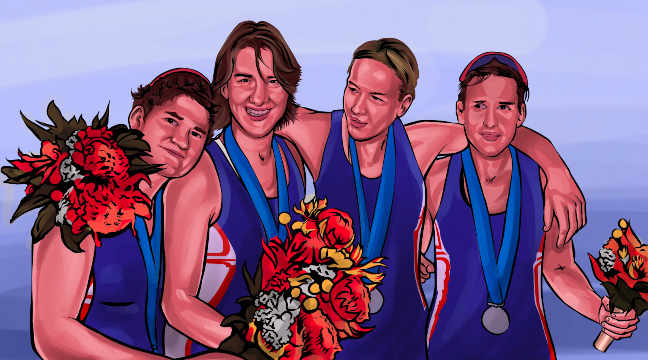
Kirsten: After we won, literally still on the jetty, my boyfriend proposed and we got married. He was also a rower. I still continued rowing. We won gold in Athens with Kathrin Boron instead of my sister.
When I finished rowing after Athens, I quit the army. But through the army I did a qualification as an occupational therapist. I now work in a rehabilitation clinic for neurology patients, but I am also a coach and have been for a number of years: for very young children six to 10-year-olds giving their first introduction to rowing.
I grew up in the East German system with these very dedicated sports schools. Although I was too small in size for rowing, I made it into the rowing training squad. At school, my life was training, training, training. We were expected to win. So, the Olympic medals were just ‘okay, thank you’. Now, in hindsight, I’m incredibly proud. But for a long time, when I was starting work, I was very modest about it. I didn’t really speak about it. I wanted people to know me for who I was – not because I was a rower. Now, 20 years later, I’m far more open and am happy to talk about it.
Gillian: Winning that medal completely shaped the rest of my life. If I had left the sport never having medalled, I think that would have been really frustrating for me.
I always felt that at the right time and in the right hands, I could do something to contribute towards Britain winning a medal at the Olympics. That’s what I moved down to London from Scotland. I came from a pretty humble background.
I’m still involved in rowing. I coach teenage girls. The experience of girls who have never rowed before is a really big deal.
I’ve now come back to rowing – we row the four with Katherine [Grainger] and Kate [Mackenzie] and Cath Bishop. I really love it.
It’s really lovely, Kirsten, to finally meet and speak – I have pictures of you and your crew all over the house, but I’ve never spoken to you until now. When I spoke to my daughters and told them about this opportunity, I actually got really emotional about it.
It’s something that I still speak about and think about a lot: the whole experience was a wonderful opportunity. I really respected the crew that you were in – I thought you were absolutely phenomenal. I only wish that, at the time, we had known each other, so that we could have celebrated together in some way, but that just didn’t happen. If you could pass on my warmth to the rest of your crew now, I would really, really welcome that.
Illustration: Syahrulhart / Fiverr


